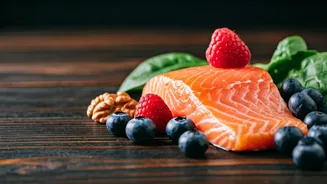Understanding Premature Graying
Premature graying of hair can be a source of concern for many, but it's important to understand the factors involved. The process typically occurs when
the body's melanin production, responsible for hair color, begins to slow down or cease. This can be caused by various factors, including genetics, stress, and, importantly, nutritional deficiencies. Nutritional imbalances can hinder the production of melanin, accelerating the appearance of gray hairs. By focusing on a balanced diet rich in essential nutrients, individuals may be able to support healthy hair and potentially delay or reduce the onset of premature graying. Furthermore, adopting lifestyle adjustments, such as managing stress, is crucial for preserving hair health and overall well-being. This proactive approach can aid in minimizing premature graying and promoting hair's natural color.
Foods for Hair Health
Incorporating specific foods into your diet can significantly contribute to hair health. These foods often contain nutrients that are vital for melanin production and overall hair vitality. For example, foods rich in antioxidants are excellent for combating oxidative stress, a major contributor to premature graying. Other key nutrients to consider include those abundant in copper, which is essential for melanin synthesis, and iron, which boosts blood circulation to the scalp, thus improving hair health. Additionally, foods loaded with B vitamins play an indispensable role in maintaining the pigment and health of your hair follicles. Focusing on a diet rich in these nutrients can lead to stronger, more vibrant hair, possibly delaying the onset of premature graying. Choosing a range of nutrient-dense options can provide a multifaceted approach to hair care from within.
Section 3: Berries for Antioxidants
Berries are not only tasty but also incredibly beneficial for hair health due to their high antioxidant content. These antioxidants help protect hair follicles from damage caused by free radicals, which can contribute to premature graying. Free radicals, resulting from environmental factors and metabolic processes, can damage the cells responsible for hair pigmentation. Consuming berries regularly can neutralize these harmful molecules, thus protecting the hair's natural color. Examples of beneficial berries include blueberries, strawberries, and raspberries, each loaded with vitamins and antioxidants like Vitamin C. Including berries in your diet is a simple yet effective way to maintain the vitality and youthful appearance of your hair. They can be enjoyed as a snack, added to smoothies, or incorporated into meals, making them an accessible and delicious addition to your hair-healthy diet.
Copper-Rich Foods Explored
Copper plays a critical role in melanin production, the pigment responsible for hair color. Copper deficiency can lead to premature graying, so including copper-rich foods is very important. Several foods are excellent sources of this essential mineral, and incorporating them into your diet can help support your hair's natural color. Examples include nuts, seeds, and organ meats such as liver. Nuts like almonds and cashews provide a significant amount of copper, as do seeds like sunflower seeds. Organ meats, though less common in some diets, offer a potent concentration of copper. A regular intake of copper-rich foods supports the body's natural processes of melanin creation, potentially slowing or preventing the appearance of gray hairs. It's advisable to combine these foods with others rich in Vitamin C, as this vitamin improves copper absorption. By strategically adding these foods, you support the vibrancy of your hair.
Iron-Rich Foods for Circulation
Iron is crucial for maintaining proper blood circulation, which, in turn, is essential for healthy hair. Insufficient iron levels can lead to poor circulation to the scalp, which in turn reduces the supply of vital nutrients to hair follicles. This can accelerate hair graying and overall hair loss. Consuming iron-rich foods helps boost the flow of oxygen and nutrients to the scalp, supporting melanin production and hair health. Excellent sources of iron include leafy green vegetables like spinach, lean meats such as beef and chicken, and fortified foods. To maximize iron absorption, it's recommended to consume these foods with Vitamin C. Adding iron-rich foods to your diet can significantly improve hair health and help combat premature graying, as well as promote overall well-being. Ensuring an adequate iron intake through diet is a straightforward way to maintain healthy, vibrant hair.
B Vitamin Powerhouse Foods
B vitamins are indispensable for numerous bodily functions, including maintaining hair color and health. Specifically, B vitamins like biotin, B12, and folate are crucial for the development and preservation of hair's natural pigment. Deficiencies in these vitamins can contribute to premature graying and other hair issues. Incorporating foods rich in B vitamins can help maintain the color of your hair and bolster its overall vitality. Foods such as eggs, dairy products, and certain seafood are excellent sources of B vitamins. For example, eggs contain biotin, vital for hair health, while dairy products offer B12. Additionally, fortified cereals and nutritional yeast can provide these essential nutrients. Supplementing your diet with these B vitamin-rich foods is a simple way to strengthen hair, potentially delaying premature graying. It’s advisable to ensure a diverse intake to cover the range of B vitamins.












